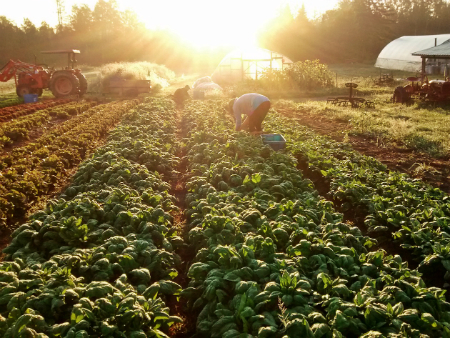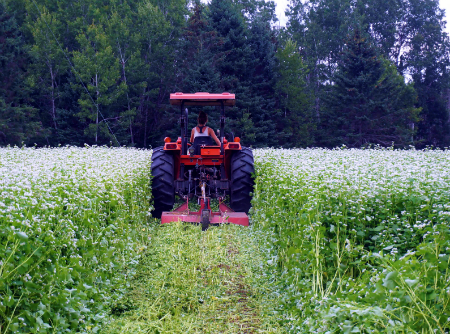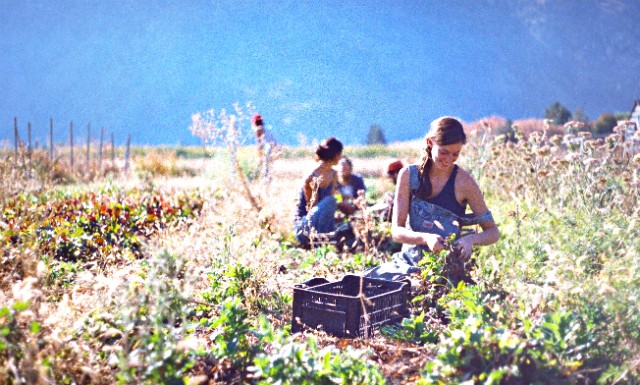By Natalie Childs, Guts, November 10, 2015
When I decided that I wanted to be a farmer, organic farms were the obvious place to look for work. Conventional farming aspires to produce the cheapest possible food for a globalized system, which I believe severely undermines the health of the soil, the health of farmers and eaters, and the resilience of communities. I felt that small-scale organic farms were working towards a more just and sustainable food system, undoing (or challenging) the conventional farm system. Overall, I still believe this to be true, and I’m proud to be a part of the steady rise in young organic farmers in Canada.
In one crucial respect, however, the organic movement is failing its commitment to creating a more resilient food system: its regressive approach to labour. The instances of unwaged labour on small organic farms are much higher than on conventional farms: one study found that, in Ontario, 65 percent of workers on small-to-medium scale ecological farms* are non-waged (making less than minimum wage), while the provincial average for the entire agriculture sector is 4 percent. That means that if you’re buying organic in Ontario (and the rest of the country), it’s a safe assumption that some of the people who grew your food were not paid for their work.
Like almost every other young farm worker I know, I entered the field through an unwaged internship. The specific details of these internships vary, but in most cases, people spend five to six months working forty to sixty hours a week on a farm for room, board, and a minimal stipend, as well as the educational experience they’re expected to gain. In my own experience, I struggled with what felt at times like an unjust arrangement—working at repetitive, mindless tasks that didn’t teach me much for a dollar or two an hour—but it wasn’t until I had been working in farming for a few years that I realized just how systemic the unpaid internship is. I interviewed a number of people* who had recently completed farm internships, and heard remarkably similar stories. The imbalances I felt in my own farm internship were not the result of bad management, but the impact of an industry-wide eagerness to rely on unpaid “interns” or “apprentices” year after year.
But aren’t there labour laws that prevent this sort of thing? Alas, no. In most of the country, labour carried out by farm workers is exempt from regular employment standards. There’s nothing requiring a farmer to pay an apprentice anything for their challenging and physically strenuous work. As a result, many internships* look like that of Kate, who recently completed a season on a Salt Spring Island farm:
In theory we worked from 6:00 am until 6:00 pm, with an hour lunch, but there were many nights where we worked until eight or nine. I even remember several nights where we worked into the dark, fixing irrigation with flashlights, working in the barn, calling it a day around ten thirty and going straight to bed. At best we worked for under two dollars per hour and at worst under a dollar.
All across the country, there are thousands of people who are committed to a more conscious and just ecological agriculture, working for a few dollars a day in order to feed Canadians. Why do we accept this situation as normal?
Sarah is one of these committed farm workers. When she began her first internship on an organic vegetable farm in Southern Ontario in April of 2011, she romanticized farming: “I still had stars in my eyes about the whole thing. It felt good to start on a new trajectory and fulfill one of my dreams by doing something completely different with my life.” She worked ten to twelve hours a day, six days a week for housing, farm food, and a $50-per-week stipend to cover groceries that weren’t grown on the small farm. She appreciated the community created on the farm and the new skills she was learning. Fairly quickly, however, a repetitive strain injury forced her to leave her position:
Within one month at the farm [carpal tunnel] symptoms began to affect everything I did—I couldn’t even hold a spoon or toothbrush without my hands going numb, and I was starting to show signs of real nerve damage, especially in my dominant hand.
Sarah saw a local doctor, a physiotherapist, and an occupational therapist—a huge expense on her $50 weekly budget.
Every one of them recommended rest in order to start healing, but when my ability to work fifty to sixty hours per week was threatened, I felt a strong push by the farmers to leave as soon as possible so they could replace me. With no money, no job, and no longer being able to work to support myself, I had to move back in with my mother after being on my own for more than ten years.
The situation was frightening. Sarah had intended to begin her new career in farming by learning from experienced farmers and had accepted that hard work and challenging conditions would be the price she paid for a valuable educational experience. Despite these expectations, however, and despite the fact that she genuinely enjoyed her time on the farm, the realities of an unpaid internship were hard to ignore:
It quickly became evident that I was only as valuable as my labour, and it was scary to know that my housing and food and (very limited) income were all directly bound up with my ability to work, and being an unpaid intern meant I had no savings and no WSIB or EI protection in the event of such an injury.
Sarah is far from alone in this experience, and the internship system that is the entry point for most new farmers in Canada is rife with exploitative labour practices. So much so that some interns are turning to the legal system. A farm on Vancouver Island was forced in mediation to compensate apprentices they had hired for their work. The lawyers consulted by the farmers were clear on the fact that although unwaged internships are common, legally, there isn’t much justification for them: nobody can sign away their rights to minimum wage. There was no uncertainty for the courts, as defendant farmer Evelyn Pereira explained, “Employment Standards is pretty black and white about what an employee is; if they are coming to your farm to do the work that an employee would do, then they are an employee.”
One might think this ruling would have been a wake-up call for the industry, but, thus far, little has changed. Part of this recalcitrance comes from the fact that labour regulations vary from province to province, and British Columbia, where the lawsuit took place, has a mandatory minimum wage law that applies to farmers. Manitoba, Quebec, Yukon, and Newfoundland and Labrador also have an absolute minimum wage, but laws in the rest of Canada expressly exempt farm workers from minimum wage requirements. These exceptions do more than impoverish workers, they also strip them of crucial workplace rights, since the same laws that determine minimum wage also regulate overtime rates, partial hours, on-call work, employees waiting for work on the work premises, piecework, deductions for board, lodging, meals, and uniforms, and workplace injury compensation. In Alberta, to take one of the most egregious examples, farmers get to choose whether or not their workers are covered under the workers’ compensation program. If you get injured on an Alberta farm and your employer didn’t voluntarily pay into the program, you’re on your own! The NDP government has signaled that they intend to change this situation, but as of August 2015 only seven percent of Alberta farm workers have workers’ compensation. It’s a scary place to be a farm worker.

There is no good reason why farmers in 2015 should be exempt from basic labour requirements, and there’s certainly no good reason why small-scale and organic farms should embrace this system. If anything, small scale agriculture should be striving to move away from the conventional food system, a system whose history of racism and exploitation continue to this day. Canada’s industrial food production system relies heavily on the poorly compensated migrant labour of the Temporary Foreign Worker program. Most of the food produced in this country is planted, harvested, and sometimes processed by workers from Mexico and the Caribbean, who work seasonally in Canada and then return home for the rest of the year. These workers, between 25,000 and 35,000 of them a year, are expected to come to Canada and grow our food, but they are not granted the same rights as citizens, or even a pathway to citizenship. Although temporary foreign workers (TFWs) are technically entitled to the minimum wage, there is no limit to the number of hours they can be required to work and they aren’t entitled to overtime pay or holidays. They are precariously dependent on the good will of their employers, and they have little legal recourse in the case of illness or abuse.
Even more egregiously, TFWs are required to make CPP and EI payments, despite receiving virtually no benefit from these programs. A study released last March by the United Food and Commercial Workers (UFCW) union, estimates workers participating in the federal Seasonal Agricultural Worker Program (SAWP) paid $8.996 million in EI premiums in 2012. Because of the Harper Government’s reform to EI regulations, however, workers will not be able to claim EI benefits unless they are “authorized to remain in Canada,” a stipulation that invalidates temporary foreign workers from filing claims.
To be clear: the demographics of temporary workers on conventional farms and interns on small organic farms are very different. Organic farm interns are mostly Canadians, overwhelmingly white, mostly female, and fairly likely to hold a college or university degree. These workers are in a considerably less precarious position than the immigrant workforce that fuels the conventional farm industry, and the labour issues faced by temporary foreign workers and organic interns are not the same ones. Any fight for intern rights, though, needs to consider the bigger picture of food production in Canada. In more ways than we realize, all Canadians are deeply indebted to the labourers who grow and harvest our food, and we need to consider ways to ameliorate the conditions for those who do that work.
If we want to improve conditions on small-scale organic farms, there are two fairly simple solutions: pay workers for their work, or set up a formal apprenticeship program that offers an explicit, formalized education and a recognized certification upon completion. Provincial governments offer the latter opportunity in many skilled trades, and there’s no reason farming apprenticeships couldn’t be regulated in the same way. The problem with the current system is that, although these positions are typically termed “apprenticeships” or “internships,” small farms rarely adhere to the legal provincial or federal standards of an apprenticeship. Apprenticeship standards vary by province and across industries, but in all cases they require that an apprentice receive a government certified accreditation at the completion of their training. As the Ontario government puts it: “Apprentices become skilled workers once they have acquired the knowledge and skills in a trade or occupation and are certified by a provincial or territorial authority.” Farm interns receive no certification, and there are no standards around what an intern can be expected to know at the end of a season.

Bernard just completed his second season of a farm internship in Nova Scotia, and he appreciated his mentors and the experiences he had. The compensation and the education he received, however, didn’t always feel equal to the labour he contributed to the farm. He and other interns were technically paid minimum wage, but had to return $800 a week for their rooms and an “educational fee.” As Bernard says,
There’s something very vulnerable and friable [about] setting up an agreement to be taught by someone who isn’t a trained teacher; even more, to be paying an “educational fee.” None of the farms I worked on have strict curricula of what interns can expect to learn; the conditions are that interns will be involved in all aspects of the farm and can learn more just by asking questions.
On a farm in New Brunswick, Hannah and Heather were effectively left to teach themselves how to farm, alongside their fellow apprentices. As Heather says, “My apprenticeship left with me with a lot of ideas of how I don’t want to farm, while this is valuable knowledge, it is definitely not the desired outcome of a farming apprenticeship.”
Educational plans for interns vary widely, and there are surely farm internships that are rigorous, formalized, and extensive. However, the system described above, in which interns are expected to do the majority of their learning simply by absorbing the farm environment and asking the right questions, is all too common. In practice, this means that many interns get a great education in some aspects of the farming business—weeding, planting and, harvesting—without getting a well rounded sense of what goes into running a farm. Lucia Stephen, food activist and program coordinator for the Atlantic Canadian Organic Regional Network (ACORN)’s Grow A Farmer Initiative points to two equally important parts of a farmer’s education:
Production skills and business skills. In order to establish a sustainable profitable farm, one set can’t go without the other, unless you are dividing responsibility among different partners involved with the farm enterprise—even still, having a general sense of both components is integral.
Many apprenticeships focus on the repetitive aspects of the production skills, without any of the business skills to go with them. Interns can finish a season without knowing anything about soil amendments, crop planning, budgeting, marketing, or selling, all crucial elements of running a small farm.
Of course, there is a huge amount of romanticism and idealism that goes into the choice to begin work on an organic farm, and one could blame young naïve workers for their choice to follow a “back to the land” dream into a situation that is more challenging than they expect. There is a “do what you love” mentality around the choice to pursue farming that masks the fact that Canadians desperately need farmers. It is true that many interns on small ecological farms in Canada are the privileged children of middle-class parents who have been raised with the idea that they should “follow their passions.” As Miya Tokumitsu points out in her analysis of the “do what you love” ideology, “according to this way of thinking, labor is not something one does for compensation, but an act of self-love. If profit doesn’t happen to follow, it is because the worker’s passion and determination were insufficient.” Farm interns who dare to speak up to their employers about hazardous work conditions, overtime hours, or insufficient pay are often rebutted with the idea that “this is just farming—you have to love it.” The idea that “nobody makes money farming” is also frequently brought up as an excuse not to pay workers. This rhetoric of organic farming treats farm labour like non-profit work, or volunteering, rather than a business.

After Sarah was forced to leave her first internship because of injuries, she took another one the following year, in Western Quebec. She describes a tense working situation which fluctuated between supportive and volatile, depending on the mood of the employer:
We shared hugs every morning before starting the workday. It didn’t take long, however, for the veneer to wear off. If someone did something wrong—and always by accident—the farmer would sometimes explode at them, reacting in ways that were entirely disproportionate to the situation. The morning hugs began to feel like a show rather than an act of caring; they felt manipulative, and some days I really did not want to hug him but didn’t feel safe to say so.
The concept of farm work as a “labour of love” that is its own reward belies the incredible toll it can take on the worker’s body, and the simple fact that work merits pay. The current internship system is certainly one of the reasons that most young Canadians don’t view farming as a valid career path, leaving gaping generational holes in the farm labour market.
As Lucia Stephen explained to me:
80 percent of Canadian farmers will face retirement within the next ten years and we are facing a looming void in agricultural production and fertile farmland in need of succession. We need to train and mentor a strong and resilient generation of new farmers NOW to ensure both the preservation and revitalization of our rural farming communities, while deepening the roots of our diversified regional food systems.
This enormous gap in the labour market needs to be filled by someone in order for Canada’s food supply to remain stable. Food Secure Canada (FSC) is one organization that is closely monitoring this issue, through collaboration with a pan-Canadian alliance of organizations and individuals working together to advance food security and food sovereignty. As one of the organization’s many projects, FSC has worked with FarmStart and the National Farmers Union Youth Caucus in creating the New Farmer Initiative (NFI)to explore challenges and opportunities facing new farmers in Canada. The NFI’s New Farmer Policy Round Up, published in March 2015, reports on consultations with new farmer stakeholders done in 2014. The report provides overarching recommendations on how to support new farmers in Canada.
NFI’s recommendations bring the looming threat of the generation gap into focus. Without a strong strategy to retain farm land and to create a new generation of agricultural workers in Canada, the number of farmers “will decline faster and faster over the next 15-20 years. This will significantly weaken Canada’s ability to sustain food production and to depend on farmland for environmental goods and services in the face of climate change.” A future of reduced fossil-fuel consumption will mean that Canada needs more local farms and farmers, not less, and we’ll need farmers and farm workers to be able to make a living growing food for Canadians. At the moment, it is difficult for struggling farmers to adequately pay their workers, particularly when they can barely pay themselves.

NFI policy recommendations emphasize a new approach to education:
The current scattered approach to teaching new farmers requires a re-think. Agricultural colleges focus largely on research and underfunded non-profits try to bridge the gap, but no clear career path exists for “first generation” farmers – those who did not grow up on a farm.
The report’s authors propose “on-farm employment/internships on accredited farms. This program would help incentivize farmers to pay a living wage and provide a rung in the learn-to-farm ladder with reliable employment.” Other NFI recommendations include “standards for training farmers of different backgrounds and sectors” and “subsidizing training programs for farmers.” These supports would go a long way towards allowing young people to consider farming as a career without automatically putting their financial and physical security in jeopardy.
Internships could be a valuable part of this career path. If internship programs had a more standardized training and educational curriculum and an accreditation system, unpaid stints of farm work in exchange for learning could be appropriate. But if you aren’t learning, you should be paid.
These educational supports would be enormously helpful in building a better food system in Canada. More broadly, what would a just food system look like for workers? It would mean support from government and consumers. It would mean ending agricultural labour exceptionalism—paying at least minimum wage to both Canadian and migrant workers, and not excluding them from the securities and benefits that other workers enjoy. Importantly, it would also require that eaters start to ask questions about who works to grow their food, no matter where they buy it. Folks who buy organic and local food because they value the health of the planet, their communities and their families also need to consider the health of those who grow their food. When buying conventionally produced food, we all need to consider how its relative cheapness is artificial—it comes largely on the backs of the workers who produce food.
No one goes into organic farming to get rich, and that won’t change any time soon. But despite their challenging apprenticeship experiences, many of the people I interviewed still intend to become farmers, and they continue working towards it. Raising the capital to actually start a business on a farm worker’s wages is yet another hurdle for first-generation farmers, but many of us will keep trying: Hannah is the manager of an urban farm in Toronto, Kate is signed on to her third season as the greenhouse manager at a Hudson Valley farm, Sarah has started her own farming venture in Ottawa. There are people who want to do this important work, and if you eat, you need them to! We need help, though: apprentices, workers, and farmers all need support from consumers and from government. Let’s set up a better food system, starting by teaching people how to farm in an effective, ecological, and profitable way.
Acknowledgements: Thanks to Caleb Glasser for research help, and to everyone who thoughtfully and generously responded to interview questions.
Natalie Childs is a farm worker in Western Quebec and an editor of GUTS. She just got Twitter and you can get in touch @nat_childs.
Images by Natalie Childs

No comments:
Post a Comment